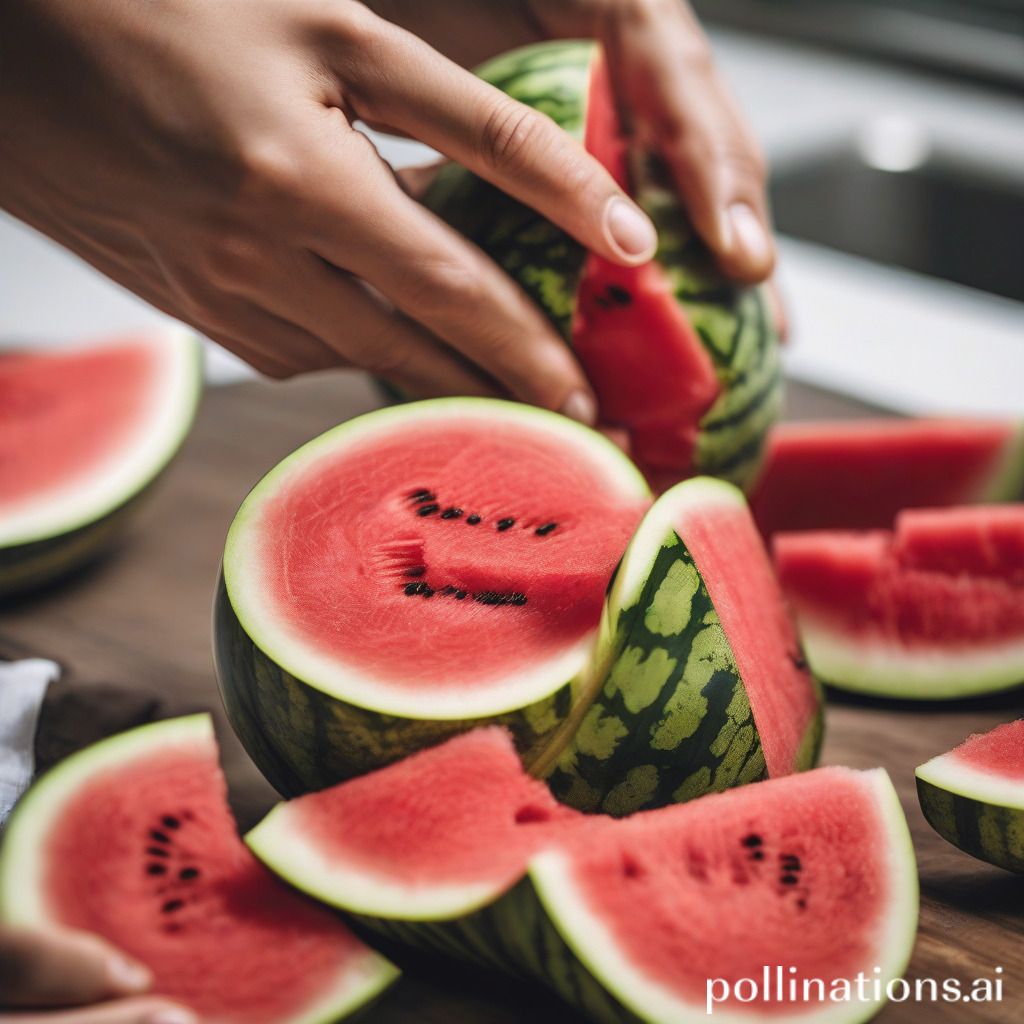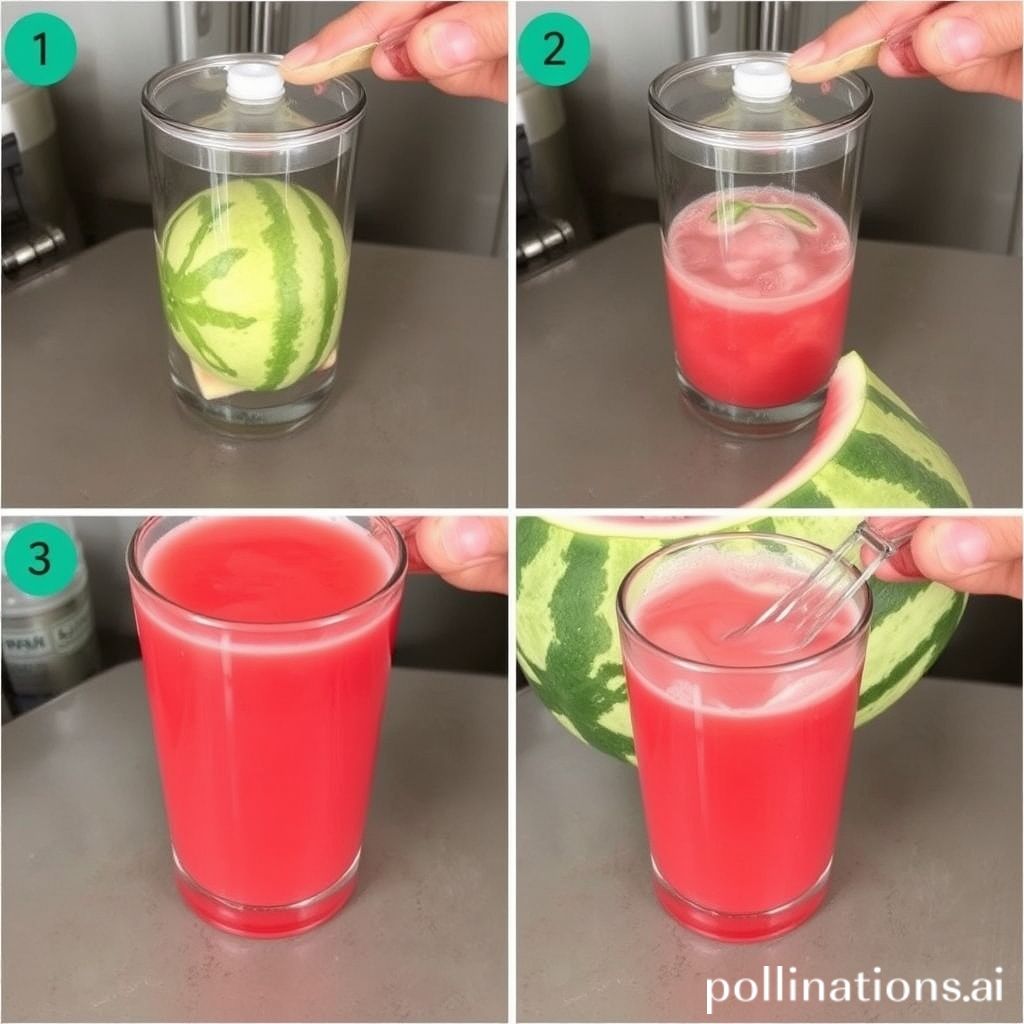How To Preserve Watermelon Juice?
[su_note note_color=”#fb8e00″ text_color=”#000000″ radius=”12″]
Attention all watermelon juice lovers! Are you tired of your delicious juice going bad too quickly? Well, fear not! We have the ultimate solution for you – preserving watermelon juice! Whether you’ve made a large batch and want to enjoy it over time or you simply want to savor the refreshing taste for as long as possible, we’ve got you covered. In this guide, we will share with you the best techniques, tips, and methods to keep your watermelon juice fresh and prevent it from spoiling.
Get ready to indulge in the sweet goodness of watermelon juice anytime you desire. Say goodbye to wastage and hello to long-lasting freshness!
[su_box title=”
[/su_box]

Embracing the Shelf Life of Watermelon Juice
1. Factors that Affect the Freshness of Watermelon Juice
Preserving the freshness of watermelon juice depends on several factors:
- Quality of Watermelon: The quality of the watermelon used to make the juice plays a significant role in determining its shelf life. Juice made from ripe, fresh, and high-quality watermelons stays fresh for longer.
- Storage Conditions: Proper storage conditions are crucial for maintaining the freshness of watermelon juice. Exposure to heat, light, and air can accelerate spoilage. It is advisable to store the juice in airtight containers in the refrigerator.
- Added Ingredients: If you add any additional ingredients to the watermelon juice, such as lemon juice or sugar, they can affect its shelf life. These ingredients may introduce bacteria or other microorganisms, causing the juice to spoil more quickly.
2. How Long Does Watermelon Juice Typically Last?
The shelf life of watermelon juice can vary depending on various factors, but on average, it can last for:
| Storage Method | Shelf Life |
|---|---|
| Refrigerated (in an airtight container) | 3-5 days |
| Frozen | 6-8 months |
It is essential to note that these are general guidelines, and the freshness of the watermelon juice may vary based on the mentioned factors. Always use your judgment and sensory evaluation to determine if the juice is still safe to consume.
[su_highlight background=”#f6b40f”]Expert Tips: Use ripe, high-quality watermelons and store juice in airtight containers in the fridge to extend shelf life.[/su_highlight]
Tips for Properly Storing Watermelon Juice
1. Refrigerating Watermelon Juice
One simple and effective way to store watermelon juice and extend its shelf life is by refrigerating it. After extracting the juice, transfer it into a clean and airtight container. Place the container in the refrigerator and make sure the temperature is set to below 40°F (4°C). Refrigerated watermelon juice can stay fresh for up to 3-4 days.
2. Freezing Watermelon Juice
If you want to store watermelon juice for a longer period, freezing it is an excellent method. Start by pouring the juice into ice cube trays or freezer-safe containers, leaving some space for expansion. Seal the containers tightly and place them in the freezer. Frozen watermelon juice can be stored for up to 6 months. When you’re ready to use it, thaw the juice either in the refrigerator or at room temperature.
3. Using Airtight Containers for Storage
The choice of containers is crucial in preserving the freshness of watermelon juice. Opt for airtight containers made of glass or BPA-free plastic. These containers prevent air and moisture from entering, which can cause spoilage. Make sure the lids are tightly sealed to maintain the quality of the juice for a longer duration.
4. Avoiding Exposure to Sunlight and Heat
Watermelon juice is sensitive to sunlight and heat, which can lead to quick spoilage. Store the juice in a cool and dark place, away from direct sunlight and heat sources such as stoves or radiators. Sunlight and heat can alter the taste, color, and nutritional content of the juice.
| Storage Method | Shelf Life |
|---|---|
| Refrigeration | 3-4 days |
| Freezing | Up to 6 months |
Preserving Watermelon Juice through Pasteurization
1. The Process of Pasteurizing Watermelon Juice
Pasteurization is a widely used method to preserve the freshness and quality of watermelon juice. The process involves heating the juice to a specific temperature for a certain period of time to kill harmful microorganisms, bacteria, and enzymes that can lead to spoilage.
Here are the steps to pasteurize watermelon juice:
- Step 1: Start by selecting ripe and fresh watermelons. Thoroughly wash them to remove any dirt or contaminants.
- Step 2: Cut the watermelons into small pieces and remove the seeds. Place the fruit in a blender or juicer and blend until smooth.
- Step 3: Pour the juice into a large pot and heat it slowly over medium heat. Use a cooking thermometer to monitor the temperature.
- Step 4: Once the juice reaches a temperature of 160°F (71°C), maintain it at this temperature for at least one minute. This will effectively kill any harmful microorganisms.
- Step 5: Remove the pot from the heat and let the juice cool down. Once cooled, strain the juice to remove any remaining pulp or solids.
2. Benefits of Pasteurization in Extending Shelf Life
Pasteurization offers several benefits in extending the shelf life of watermelon juice:
- Increased Storage Time: By eliminating harmful bacteria and enzymes, pasteurization helps prolong the freshness of watermelon juice, allowing it to be stored for a longer period.
- Reduced Spoilage: Pasteurization significantly reduces the risk of spoilage due to microorganisms, ensuring that the juice remains safe and enjoyable to consume.
- Retains Nutritional Value: The pasteurization process is gentle enough to preserve most of the nutritional value of watermelon juice, including essential vitamins and minerals.
- Convenient Preservation: Pasteurized watermelon juice can be stored in glass jars or bottles, refrigerated, and consumed at a later time, making it a convenient option for those who want to enjoy fresh juice year-round.

Preserving Watermelon Juice: Adding Preservatives
1. Types of Preservatives Suitable for Watermelon Juice
- Natural Preservatives: You can use natural options like lemon juice, citric acid, or honey as preservatives for watermelon juice. These not only extend the shelf life but also add flavor and nutritional value.
- Chemical Preservatives: Another option is to use chemical preservatives such as sodium benzoate or potassium sorbate, which are commonly used in the food industry. These additives prevent the growth of harmful microorganisms, ensuring the safety of the watermelon juice.
2. Guidelines for Adding Preservatives
When adding preservatives to watermelon juice, it’s important to follow these guidelines:
- Measure Accurately: Use the recommended amount of preservatives based on the volume of watermelon juice you have.
- Follow Instructions: Read the instructions provided with the preservative carefully, as different preservatives may require specific handling or mixing instructions.
- Mix Thoroughly: Make sure the preservative is evenly distributed throughout the watermelon juice by stirring or shaking it well.
- Store Properly: After adding preservatives, store the watermelon juice in airtight containers in the refrigerator to maintain its freshness and quality.
| Information |
|---|
| Preserving watermelon juice is a common concern for individuals who want to extend its shelf life. |
| Adding suitable preservatives, whether natural or chemical, can help prevent spoilage and maintain the freshness of watermelon juice. |
| Accurately measuring and following the instructions for adding preservatives is essential for optimal results. |
| Properly storing the watermelon juice after adding preservatives ensures its longevity and quality. |
[su_note note_color=”#ea2e0c” text_color=”#ffffff” radius=”8″]Extra Tips: Safely extend the shelf life of watermelon juice by using natural or chemical preservatives, following accurate measurements and proper storage.[/su_note]
Using Citric Acid to Preserve Watermelon Juice
1. How Citric Acid Can Help Preserve Freshness
Citric acid is a natural preservative that can extend the shelf life of watermelon juice. It creates an acidic environment that inhibits the growth of bacteria and other microorganisms that cause spoilage. Citric acid also enhances the flavor and maintains the vibrant color of the juice.
When added to watermelon juice, citric acid acts as a chelating agent. It binds with metal ions that can promote oxidation and degradation. By reducing the presence of these metal ions, citric acid helps preserve the freshness of the juice.
Furthermore, citric acid has antimicrobial properties that inhibit the growth of yeast and molds, common culprits in juice spoilage. By preventing the growth of these microorganisms, citric acid helps prevent the formation of off-flavors and slimy textures.
2. Proper Usage and Dosage of Citric Acid
When using citric acid to preserve watermelon juice, it is important to follow the recommended usage and dosage guidelines. The recommended dosage is 0.1% to 0.3% of the total volume of juice.
To use citric acid, dissolve the required amount in a small quantity of water before adding it to the juice. This ensures even distribution of the citric acid throughout the juice. It is important to note that citric acid should be added before any sugar or other additives, as it may react differently in their presence.
It is also advisable to conduct a small-scale test before using citric acid on a larger batch of watermelon juice. This allows you to adjust the dosage according to your preference and ensure the desired freshness is achieved without compromising the taste of the juice.
Conclusion
Preserving watermelon juice is a simple process that can help you enjoy its freshness and flavor for longer. By abiding by a few key steps, such as using airtight containers, keeping it refrigerated, and adding lemon juice as a natural preservative, you can ensure that your watermelon juice stays fresh and delicious.
Whether you want to store it for later use or simply extend its shelf life, these methods will help prevent spoilage and maintain the natural goodness of your homemade watermelon juice. So go ahead and savor the refreshing taste of watermelon juice whenever you desire, knowing that it will stay perfectly preserved.
Faq about How To Preserve Watermelon Juice?
FAQ 1: Can I store watermelon juice at room temperature?
Watermelon juice is best stored in the refrigerator to maintain its freshness and prevent bacterial growth. Storing it at room temperature can lead to spoilage and a shorter shelf life.
FAQ 2: Can I add sugar to preserve watermelon juice?
Adding sugar to watermelon juice is not necessary for preservation. In contrast, if you prefer a sweeter taste, you can add a small amount of sugar or a natural sweetener of your choice. Keep in mind that adding sugar may slightly alter the flavor profile.
FAQ 3: Is it necessary to strain watermelon juice before storing?
Straining watermelon juice before storing is not mandatory but can help remove any pulp or seeds, resulting in a smoother consistency. If you prefer a pulp-free juice, it is recommended to strain it using a fine-mesh strainer or cheesecloth.
FAQ 4: Can I mix watermelon juice with other fruits for preservation?
Yes, you can mix watermelon juice with other fruits for preservation. In contrast, keep in mind that the shelf life and taste may vary depending on the additional fruits used. It is advisable to consume the mixed juice within a shorter period and store it in the refrigerator.
FAQ 5: What are some signs that watermelon juice has gone bad?
Some signs that watermelon juice has gone bad include a sour or off-putting odor, a change in color (such as becoming darker or cloudy), or a strange taste. If you notice any of these signs, it is best to discard the juice to avoid potential foodborne illnesses.
Read Similar Post:
1. Can Watermelon Juice Spike Blood Sugar? Debunking the Myth
2. Can Watermelon Juice Soothe Gastritis Symptoms?

